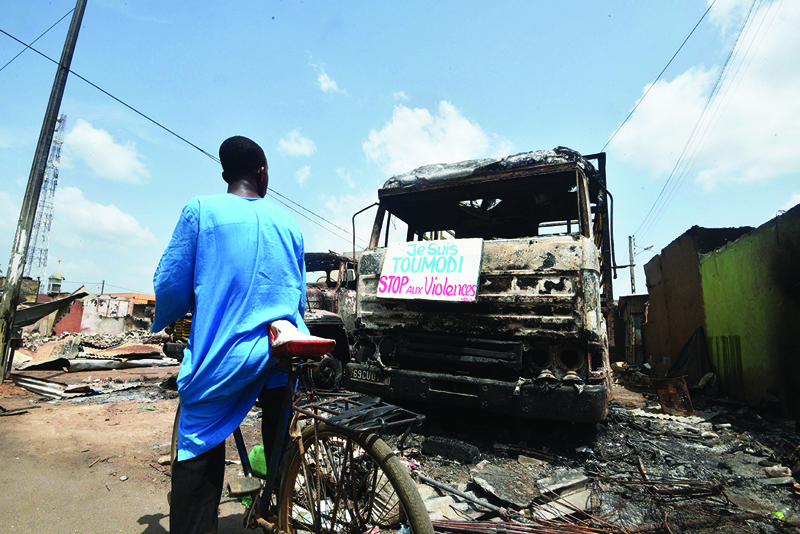
ABIDJAN: Security forces surrounded the homes of Ivory Coast's opposition leaders on Tuesday after they rejected President Alassane Ouattara's re-election and vowed to set up a "transitional government". Ouattara won a third term by a landslide in Saturday's vote, which was boycotted by the opposition claiming an "electoral coup" in a nation with a constitutional two-term presidential limit.
The standoff has pitched Ivory Coast deeper into a three-month crisis that has claimed several dozen lives, triggering appeals for calm and dialogue from the West African ECOWAS bloc, the United Nations, African Union and EU. Hours after 78-year-old Ouattara was declared winner of the presidential election, with more than 94 percent of the vote, Justice Minister Sansan Kambile accused the opposition of "acts of assault and plotting against the authority of the state". The public prosecutor has been asked to investigate, Kambile said, warning that "all options are on the table."
Opposition leader Pascal Affi N'Guessan had told reporters late Monday that opposition parties and groups were forming a "council of national transition". "This council's mission will be to… create a transitional government within the next few hours," N'Guessan said. The goal, he said, was to "prepare the framework for a fair, transparent and inclusive presidential election". Ouattara's landslide in Saturday's vote had been widely expected-two opposition leaders had called for a boycott and a civil disobedience campaign.
But there were protests and bloody clashes-at least 30 people died-before Saturday's vote. The violence is stirring memories of a crisis a decade ago that tore the country apart and dealt it lasting economic damage. Around 3,000 people died after then-president Laurent Gbagbo refused to accept defeat by Ouattara. N'Guessan late Monday said the "transitional council" would be led by opposition veteran Henri Konan Bedie, 86, a former president and long-term adversary of Ouattara. "Keeping Mr Ouattara as head of state could lead to civil war," he warned.
Confrontation
In Abidjan, the economic capital, security forces blocked off roads close to Bedie's home, AFP journalists said. They fired teargas to disperse small groups of supporters and journalists outside, preventing the staging of a press conference. The forces then entered Bedie's home but a diplomatic source said he was not worried. Bedie's deputy Maurice Kakou Guikahue was taken away by police, according to several journalists at the scene.
But sources close to the government said that Guikahue was not arrested, instead taken back to his home. Two other opposition figures told AFP that their homes were being guarded by police. "I am at home, there are 12 officers in the street in front of my house and a police van around the back," said Assoa Adou, secretary general of the Ivorian Popular Front.
"I'm fine, but it's the blockade. We cannot leave my home," said Albert Abdallah Mabri Toikeusse of the small UDPCI party. Police were also outside N'Guessan's home, his spokesman Issiaka Sangare said. In Daoukro, an opposition stronghold 235 kilometers north of Abidjan, anti-Ouattara protesters were manning barricades. "These results are a farce," said one, who gave his name as Firmin. "We are going to carry on with civil disobedience until Ouattara steps down." In Geneva, the UN's refugee agency said more than 3,200 people had fled into neighboring Liberia, Ghana and Togo, fearing violence.
EU appeal
The crisis is another test for a region where Guinea is mired in a post-election dispute of its own, Nigeria is emerging from widespread unrest and Mali has a transition government following a coup. The UN, AU and ECOWAS in a joint statement called on Ivory Coast's opposition to "respect constitutional order" and seek dialogue, while urging all sides to show "restraint to preserve human lives".
EU diplomacy chief Josep Borrell meanwhile expressed "deep concern over tensions, provocations and incitements to hatred" and called for violence to be "independently investigated." A mission from the US watchdog Carter Center said "the overall context and process did not allow for a genuinely competitive election," but an African Union observer team said the vote was "generally satisfactory".
Ouattara had said after his second term he planned to make way for a new generation. But the sudden death of his chosen successor in July prompted him to seek a third term. He says a constitutional court ruling approved his move, allowing him to reset the country's two-term presidential limit.- AFP











